Travel diary: Join the FEMaLe project on a trip to the European Parliament
The FEMaLe research project is anchored at the Department of Public Health, and it has put the widespread women’s disease endometriosis on the agenda – first in Denmark and now also in Europe. Below, Academic Coordinator Ulrik Bak Kirk talks about when he and a handful of colleagues had an opportunity to speak at the European Parliament in Brussels in late November 2023.
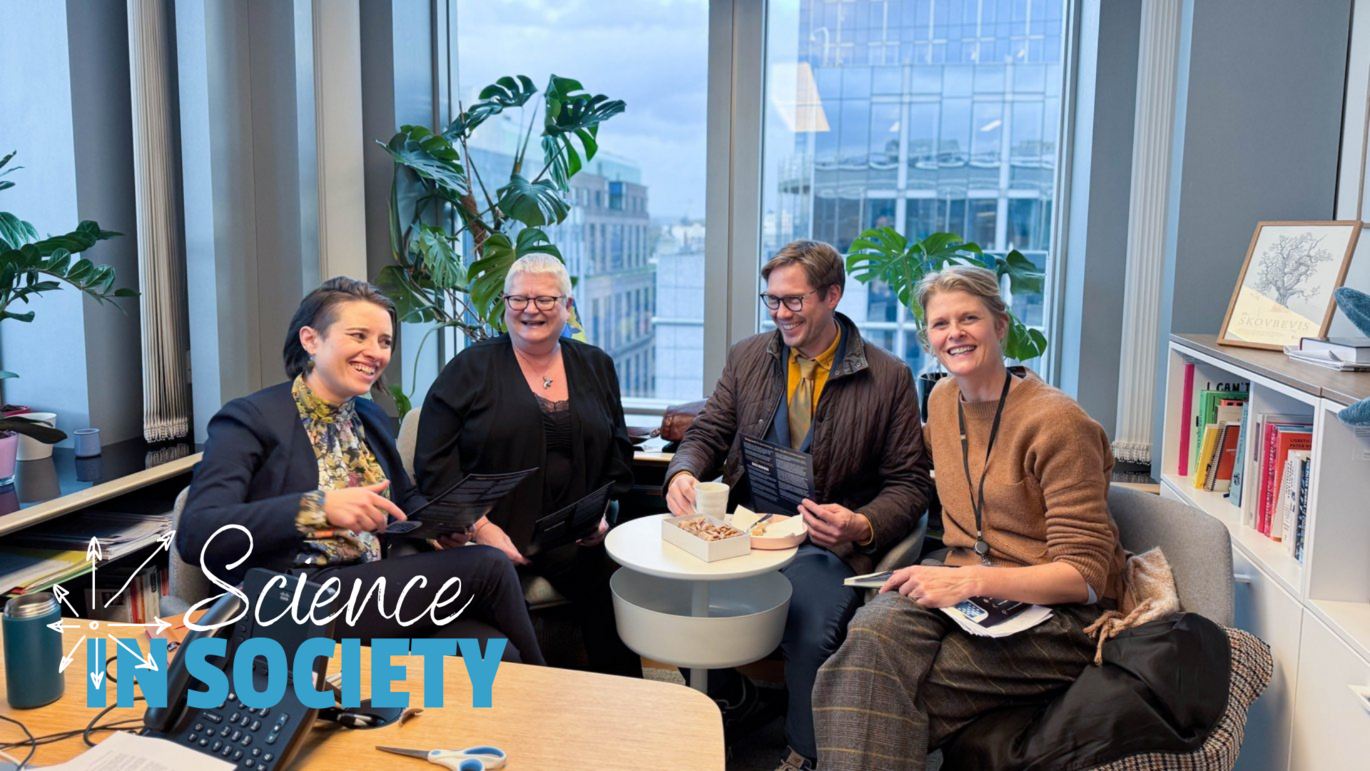
Science in society
The University Act requires that researchers, alongside their research and teaching, engage in disseminating their work through so-called knowledge exchange or research-based communication.
“Science in society” is a series of articles about Health researchers who apply their expertise in society in ways that go beyond traditional research communication and expert commentary.
"Your ticket won’t work because it’s a dog ticket," the service worker says indulgently, as I try to figure out why I can't pass the barrier to the train that will take me all the way to the corridors of power in the heart of Brussels. I laugh at myself and note that I’m already a little nervous. Everything is just as it should be when something big is at stake.
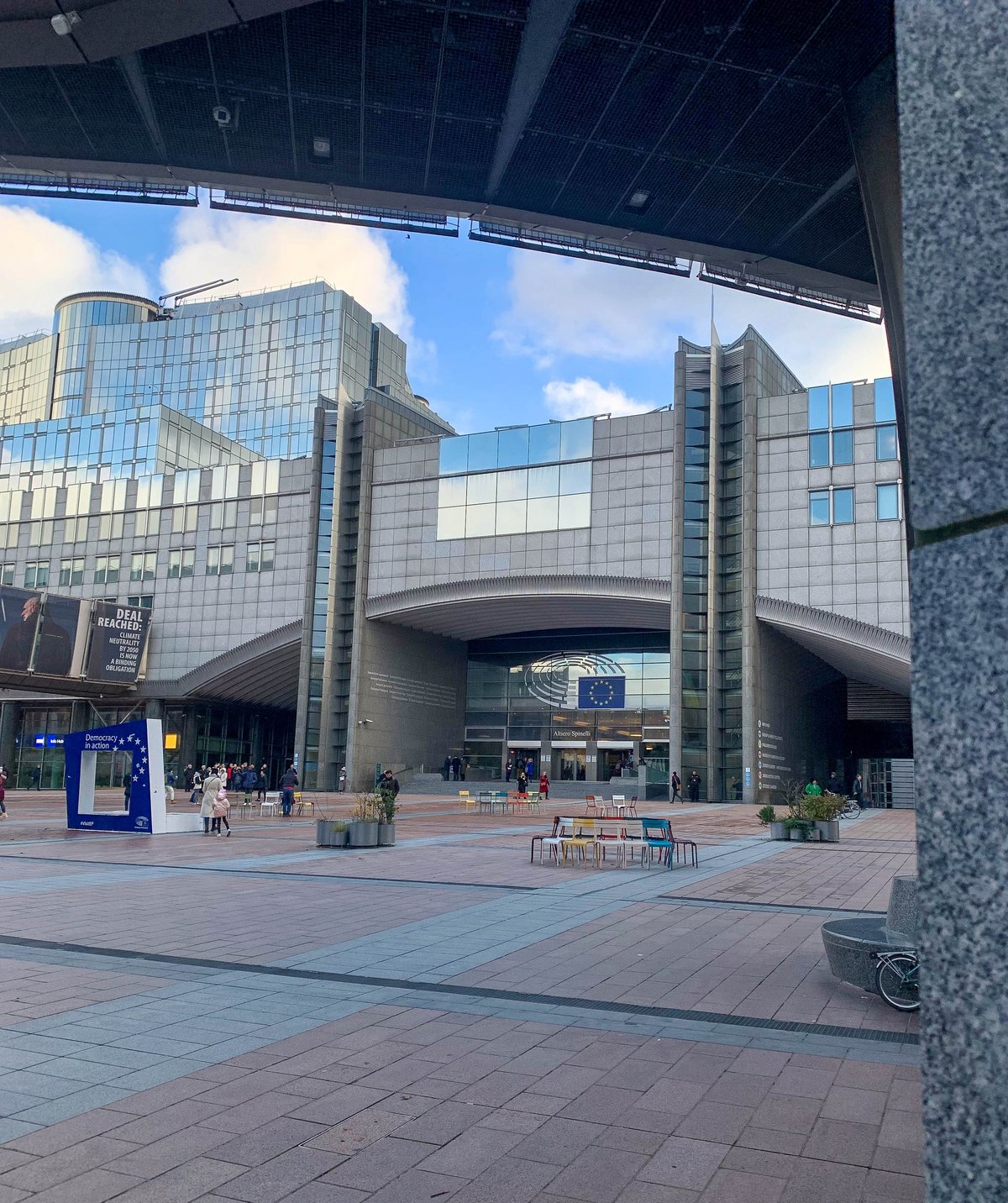
The European Parliament in Brussels is a melting pot of cultures, politics and visions. But behind the modern architecture and impressive towers of the Altiero Spinelli building is, at least for me, a closed and unknown world of busy career people, corridor discussions and campaigns, where important topics, such as endometriosis, are put on the agenda and discussed both formally and informally.
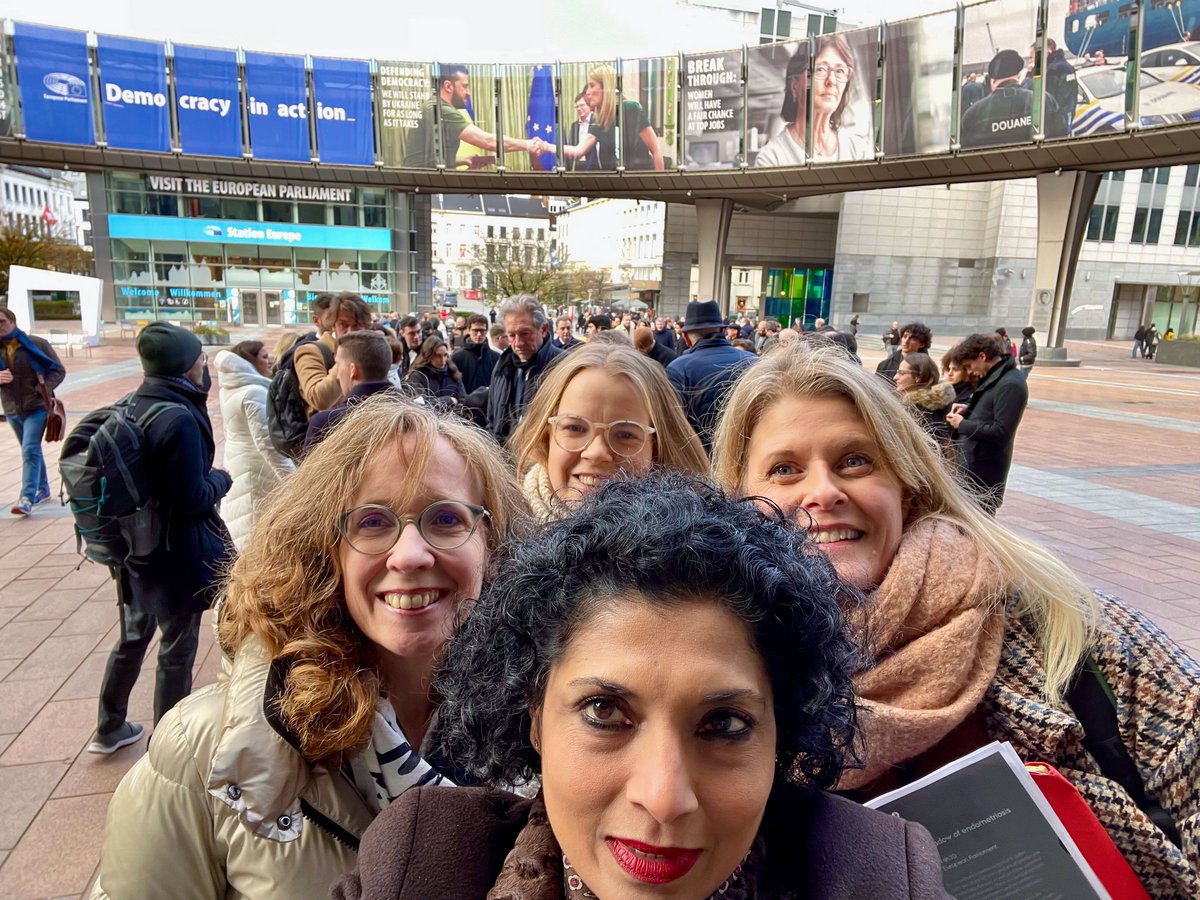
Before I step onto the vast stage in Brussels with my colleagues, I experience a mixture of emotions; a combination of nerves and great responsibility. I can feel that I’m both proud and humbled. And the same goes for my travelling companions – Bharati Shivalkar (front), Frauke Christ (left), Lina Christensen (right) and Mathilde Dam (back).
It may sound a little silly or pompous, but it feels like we all stop for a second to share a mental snapshot of a historic moment when our fight against endometriosis is finally going to be seen and heard.
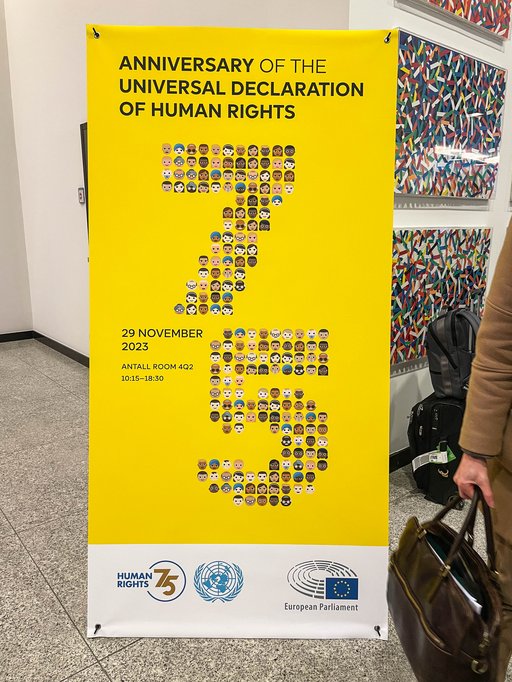
The first thing we meet on our way into the Parliament is the marking of the 75th anniversary of the UN Universal Declaration of Human Rights on that very same day. Spirits are high. This is a grand and august occasion. For a group of passionate endometriosis advocates, speaking at the European Parliament is huge, and we’re all very excited.
How will our talk be received? Will our words have the desired impact? Can some of the participants help us and move our cause forward? These are just some of the thoughts at the back of my mind as I mentally prepare to deliver the agreed key message: We urgently need prioritised research funding for women's health, not least for endometriosis. And we can’t afford not to act.
I desperately want to evoke deep feelings and sympathy for our cause among the audience; 43 participants from 13 countries across 19 organisations who have prioritised our afternoon session, as well as a lot of virtual attendees.

Five of us from the FEMaLe project will be talking at the event, supplemented by a speaker from the European Commission who will update us on European Health Data Space (EHDS). The EHDS will create an IT infrastructure for sharing health data across Europe to increase the public's digital access to, and control of, their own health data, and to ensure a secure and efficient structure for use of health data for research, innovation, policy-making and legislation. Right up FEMaLe’s alley.
Today's FEMaLe team consists of the lovely people pictured here with myself on the far right. We managed to get through to the busy EU office of Pernille Weiss MEP and make this opportunity to speak a reality with help from Lina Christensen from the Central Denmark EU Office (CDEU):
- Professor Krina Zondervan from University of Oxford (back), an Honorary Skou professor at Health
- Professor Nicolas Bourdel from SurgAR in France (far left), who uses artificial intelligence to diagnose and optimise this deeply complicated surgery
- Patient Adrienn Salamon from Hungary (left), who has also helped develop the Lucy app that we use in FEMaLe
- Endometriosis Advocate Lone Hummelshøj from England (right), who runs the initiative endometriosis.org
- Policy Officer Jerome De Barros from the European Commission(centre).
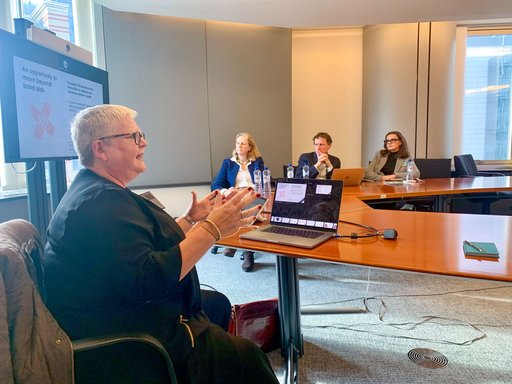
Before our five short FEMaLe talks take place, we gather around an oval wooden table, which for me stands as a democratic symbol of opportunity and influence. A month of hard preparation has gone by.
It’s difficult to describe in few words we how we got through to the European Parliament, but the first step came after I saw a post from Pernille Weiss' press intern on LinkedIn and used this to open a door for myself and the project.
Since then, we’ve continuously coordinated with Pernille Weiss’ office and the CDEU, because the European Parliament require all speakers and participants at an event such as ours to register. This is to ensure complete transparency.
In addition, we planned and executed a comprehensive communication strategy to ensure support and awareness for the EU event, which communicatively builds directly on the hearing on endometriosis in the Health Committee of the Danish Parliament on 15 November 2023.
We also closely aligned our five talks in advance to make full use of the limited speaking time and to avoid redundancy and information overload. The fight against endometriosis is close to all our hearts, and we find it difficult to hold ourselves back. Our talks are a mix of personal stories, hardcore facts, research results and hopes and dreams for the future.
When I take the floor after a passionate welcome from Pernille Weiss in which she clearly demonstrated her commitment and ownership of our agenda, there is a moment of deep silence. I chant to myself: 7-10-99, before I give my talk on the consequences for the estimated 10 million women suffering from endometriosis in the EU:
It takes at least 7 years to be diagnosed, and women see 7 doctors on average before they are diagnosed. It’s estimated that endometriosis costs the EU EUR 99 billion annually, mainly due to the lower productivity of women in the labour market. I sense that these figures, which are based on solid research conducted before and during the FEMaLe project, make a big impression on the audience. We’re on the right track. I’ve got their attention.

Our talks are followed by an avalanche of reactions in the room and online. We’re happy and relieved. It went well. Some participants come up to us and express their support, others ask follow-up questions or share personal stories about the topic. They offer advice on how we can frame and angle our cause in the future. One take-home piece of advice is not new to us, but it’s important. And that is that the time has come to focus more on the consequences for production and competitiveness, and less on reproduction and rights. Our cause must be based on – or at least be supplemented by – a different angle in the future. I think that it’s easier for some politicians and opinion makers to relate to this type of consequence.
The five talks, which seem to have touched a raw nerve, are shared widely on social media and comments are flooding in.
“We need more research, education and funding to address this disease. Let's make sure every person with endometriosis gets the diagnosis and care they need to manage their symptoms. It’s a matter of health, well-being and human rights," writes the Federation of European Academies of Medicine (FEAM), among other things.
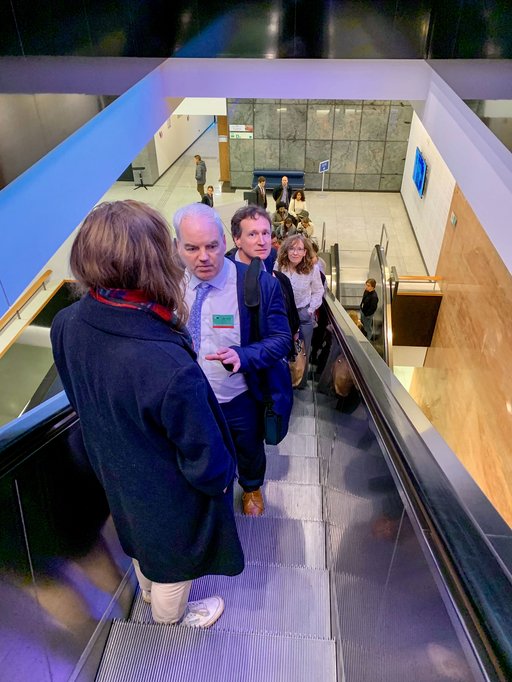
We take the escalator to a closed corridor meeting with MEP Karen Melchior to follow up on our event and to learn more about how the Parliament can help put endometriosis on the agenda.
At this closed meeting, we learn that there are good opportunities for organising a hearing similar to the one in the Danish Parliament, but we can also resort to more formal measures, such as a feasibility study, that must be approved by the European Commission. The aim of such a study would be to spread interest in fighting endometriosis to others than researchers.
It’s been a long and eventful day, and we are heading back to Denmark. Pleading your cause at the European Parliament takes courage, endless preparation and an unwavering will to fight for what you believe in. To us in the FEMaLe project and other advocates, it’s not just a moment at the podium; it’s part of a larger journey towards increased awareness and action for a cause; in our case, the fight against endometriosis.
We’re convinced that a hearing on endometriosis in Brussels could help spread information about the urgent need for much greater focus on, and allocation of resources to, research into women's diseases when the new EU programmes are to be negotiated in 2025. So now we’re committed to making that happen. Our hopes are high, and we believe in our cause.
What is FEMaLe?
- FEMaLe (Finding Endometriosis using Machine Learning) is a major international research and innovation project aiming to improve the treatment and quality of life of patients with endometriosis. The EU is supporting the project with DKK 45 million from the Horizon 2020 pool, and it is running from 1 January 2021 up to and including 31 December 2024.
- Dorte Rytter and Karina Ejgaard Hansen, both from the Department of Public Health, together with Mette Nyegaard from Statens Serum Institut (SSI), formerly at the Department of Biomedicine, are the three scientific beacons in this major international research and innovation collaboration. Professor Axel Forman from the Department of Clinical Medicine is also a central part of the project, which builds on his crucial groundwork within the field. Ulrik Bak Kirk is the main architect behind the EU application, which scored top points from the assessors, and also the project's academic coordinator.
- The project counts 40 FEMaLers from 17 partners across nine countries in the form of universities in Oxford, Edinburgh, Aberdeen, Budapest and Aarhus, technical universities in Stockholm and Riga, companies in France, Norway, Serbia, Hungary and the UK, stakeholders in civil society in Turkey, Hungary and Denmark, and Aarhus University Hospital.
- FEMaLe's first registry-based study showed that endometriosis is underdiagnosed, and that only just under 2 per cent are diagnosed in Denmark, while the project's follow-up study showed that even 10 years before a diagnosis is made, women with endometriosis use the Danish healthcare system significantly more than women without endometriosis.
- FEMaLe's most recently published study examined the value creation of a campaign co-created with patients on social media and found that the campaign created value for the individual participant, for patients with endometriosis as a group, and for society in general.
What is endometriosis?
Endometriosis is a chronic disease in which tissue similar to the lining of the uterus grows outside the uterus. For many, this is associated with debilitating painful symptoms.
- The World Health Organization (WHO) recognises the crucial impact of endometriosis on women's reproductive health, well-being and quality of life: Endometriosis affects one in ten women in their most productive years. This corresponds to 130,000 Danish women and 190 million women globally.
- Endometriosis is caused by an interaction between genes and the environment, but the cause remains unknown. Women with endometriosis have a greater risk of infertility, fatigue, chronic pain and other complications. Endometriosis is also associated with significantly impaired physical and mental health.
- Endometriosis can be considered a widespread disease with a negative impact on women's quality of life, as well as a significant socioeconomic burden. Annual health costs of endometriosis are estimated at DKK 9 billion (2012 figures) in Denmark alone. This is comparable to other chronic diseases.
- Endometriosis is also subject to many myths and misconceptions, which again affect healthcare stakeholders and hamper the necessary political attention and support.
(Sources: FEMaLe and WHO. For precise source references, please contact Ulrik Bak Kirk)
Want to find out more?
- Read the article "DKK 45 million for research into stigmatising women's disease" on Health's website.
- Watch the video from the open hearing on endometriosis in the Health Committee of the Danish Parliament on 15 November 2023 via the Danish Parliament's website.
Contact
Academic Coordinator and Senior Consultant Ulrik Bak Kirk
Aarhus University, Department of Public Health
Mobile: (+45) 28 86 48 63
Email: ubk@ph.au.dk